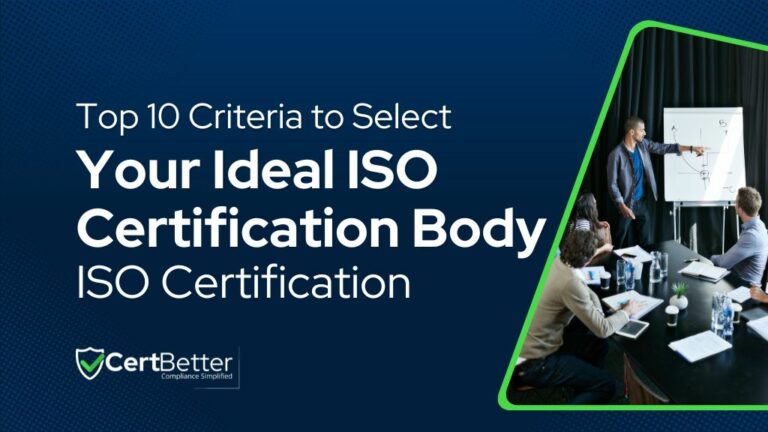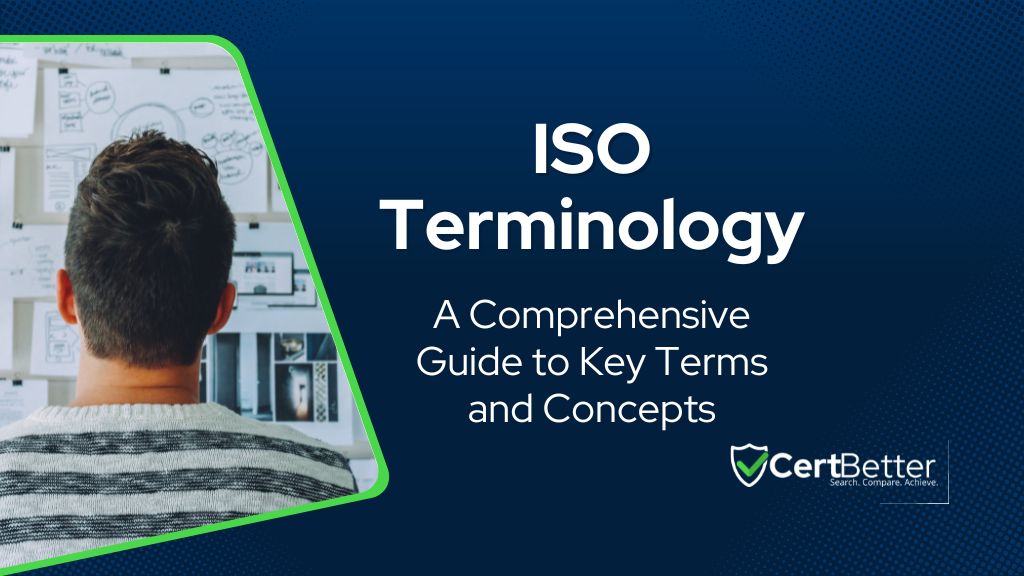10 Steps to Select Best ISO Certification Body [Free Checklist]

The journey to your ISO certification begins with selecting the best and most appropriate certification body for your business needs. This decision has a significant impact on the certification process and your experience with it. Achieving ISO Certification marks a significant step towards demonstrating your business excellence and a commitment to ongoing improvement in a particular area (for example, Quality Management or Environmental Management).
What is the role of a Certification Body?
The major role of a certification body is to guide (and of course audit) businesses through an independent certification process, making it easier to understand ISO certification requirements.
Therefore, selecting the right ISO certification body is a crucial step. It not only makes the process simpler but also makes sure that the certification your business achieves is actually valuable.
10 Steps to Choose Best ISO Certification Body
Just to make it very clear that we are talking about legitimate ISO certification bodies, not companies posing as accredited certification bodies. I have seen some companies certified by non-accredited ISO certification bodies that eventually ended up in a waste bin.
Let’s check out some of the key factors to consider when choosing an ISO certification body. Here’s summary if you’re in a hurry:
- Third Party Accreditation
- Relevant Industry Experience
- Cost of Certification
- Local Presence
- Reputation
- Transparency
- Customer Support
- Tailored Approach
- Technological Capabilities
- Value-Added Trainings
1. Third Party Accreditation
No doubt, the foremost and first step is to confirm the legitimacy of any ISO certification body by checking its accreditation with internationally recognized organizations or accreditation forums. In case you’re wondering, I have explained the difference between accreditation vs certification.
Recognised bodies such as the JAS-ANZ (Joint Accreditation System of Australia and New Zealand or other international accreditation forums uphold high standards for accreditation, ensuring that certification bodies have the requisite expertise and operate with integrity.
Accreditation means a certification body is competent, credible and complies with stringent ISO accreditation requirements.
Accreditation a mark of trust, showcasing the certification body’s capability to perform independent ISO certification audits and grant certifications to businesses.
Selecting a certification body accredited by recognised bodies such as JAZ-ANZ in Australia should be your first step towards ensuring a legitimate ISO certification.
2. Relevant Industry Experience
A certification body with experience in your industry brings a deeper understanding of the specific challenges, needs and best practices unique to that industry.
This kind of experience is incredibly valuable when dealing with the intricacies of ISO standards in a specific industry.
IMPORTANT — Don’t forget to request client examples to validate their industry experience when you’re talking to their sales rep!
Expertise plays a crucial role in making the certification process go smoothly. It ensures that audits are carried out effectively and that the information and recommendations provided are practical and pertinent.
The combination of industry experience and expertise not only makes the certification process smoother but also brings valuable knowledge and practices to the organization. This knowledge is essential for maintaining ISO certification and continually enhancing operational processes.
3. Cost of Certification
Just like every business decision involves financial considerations and selecting an ISO certification body is no different.
It’s important to pick a certification body that provides a straightforward and transparent fee structure, guaranteeing that you get good value for your money.
IMPORTANT — Many certification bodies use different pricing strategies to maintain their profit margins. Some charge annual fees, while some include charges for traveling to your business location. It’s important to understand these costs when making your decision.
Hidden costs can be a potential issue, so it’s crucial to have a in-depth conversation about the financial aspects of your certification. This should include any extra fees for follow-up audits (in case, your audits result in major non-conformances!) or other services.
Getting a clear picture of the financial commitment upfront and later expenses allows you to make an informed decision. This way, the certification process doesn’t become a financial burden but rather a valuable investment.
Recomended read: How ISO Compliance Reduces Global Business Risks in 2024
4. Local Presence
Having a certification body with a local presence can have a significant impact on communication and coordination during and after the certification process.
Having a local presence makes communication simpler by aiding in the scheduling of future surveillance or recertification audits and meetings. It also ensures a quicker resolution to any questions you may have.
PRO TIP
Many certification bodies use contractor auditors for audits who might not be available in the future.
To prevent additional travel and accommodation expenses, ensure that your chosen certification body has its own local staff or contractor auditors in your city.
When a certification body has a local or regional presence, it enhances the efficiency and effectiveness of the certification journey, making it a collaborative and rewarding experience on the path to ISO certification.
Accessibility works closely with having a local presence, ensuring that you can interact promptly and resolve any issues that may come up during the certification process or at a later stage.
5. Reputation
A certification body’s reputation often reflects its competence and integrity. To gauge this, looking into past client reviews and testimonials can be incredibly insightful.
Customer reviews and testimonials offer a glimpse into the quality and dependability of the certification body’s services.
A reputable certification body with positive client testimonials is likely to be a trustworthy choice for pursuing ISO certification.
They provide a window into the experiences of other businesses, giving you valuable information about the certification body’s professionalism, expertise and the value it brings to the certification process.
6. Transparency
Transparency in the certification process is essential for establishing trust and making your ISO certification journey as smooth as possible.
Maintaining open communication between the certification body and your business is crucial. It helps address questions, clarify uncertainties and ensure that you are well prepared for every phase of your certification process.
A transparent certification process, characterized by clear communication, lays the groundwork for a successful ISO certification experience.
Having a clear understanding of the steps right from day one will enable you to better manage your expectations throughout the certification journey.
7. Customer Support
The ISO certification journey doesn’t stop after obtaining the certification; it’s an ongoing process that extends into post-certification support. Engaging in continuous improvement is essential for maintaining certification and enhancing operational excellence.
A certification body that offers great customer support by simplifying the certification process, scheduling your future audits, offering feedback on ISO compliance and giving guidance when you need it most becomes a valuable partner in your organisation’s pursuit of continuous improvement.
8. Tailored Approach
Every organisation is unique, with distinct operational dynamics, challenges, and objectives. A customised approach enhances the relevance and value of the ISO certification.
A customised approach in the certification process, tailoring the audits and assessments to the organisation’s specific needs, ensures a more relevant and valuable certification experience.
Flexibility in adapting to the organisation’s schedules, operational constraints, and specific concerns is indicative of a certification body’s commitment to addressing the unique needs of each organisation.
9. Technological Capabilities
In this era of digital transformation, harnessing technology for efficient certification is a major advantage.
Since the COVID-19 pandemic, many ISO certification bodies are shifting towards hybrid or remote auditing services, which can be quite advantageous for companies that are tech-savvy.
IMPORTANT — Remote audits are usually conducted through MS Teams video conferencing and file sharing systems, however, ensure that your intellectual property is also secured.
Certification bodies with robust digital platforms facilitate seamless interactions, document sharing and scheduling audits, making the certification process smoother and more efficient.
Technological capabilities such as online training resources, digital audit tools, and interactive communication platforms enhance the efficiency and effectiveness of the certification process.
10. Value-Added Trainings
Obtaining ISO certification requires a thorough understanding of the entire process, not to mention the standards themselves. Therefore, developing your internal knowledge is essential for establishing, maintaining, reviewing and consistently enhancing your management systems to meet ISO standards’ requirements.
Value-added trainings offered by the certification body helps in building internal competencies necessary for managing the system effectively at your business.
Many ISO certification bodies have value-added resources such as internal auditing trainings, guidelines, checklists and other material that can significantly assist in enhancing your business knowledge related to ISO.
A certification body that invests in empowering its clients through training and resource availability is a valuable partner in the ISO certification journey.
Download Checklist For Certification Body Selection
Ready to put the above ideas into action? No worries! Use my exclusive checklist to pick your ideal Certification Body.
Final Thoughts
Making a wise decision in choosing the best and right ISO certification body is a strategic move toward achieving your ISO certification. When you navigate this path with the right certification partner, you secure not only a satisfying experience but also lay the groundwork for continuous improvement and operational excellence.
- Last updated: June 11, 2024
- CertBetter
Our community of compliance professionals and ISO experts is ready to provide you with insightful answers and practical solutions. Join the discussion now!
- Recommended Reads
- 36 reads
-
Frequently Asked Questions
Understanding ISO Terminology: Guide to Important Terms and Concepts
No posts found
ResetConnect with ISO Certification Consultants
CertBetter makes it easy to find ISO certification consultants and compliance professionals from around the globe.

